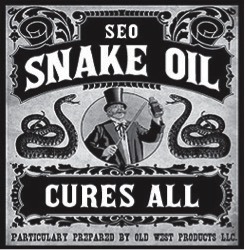How to avoid getting hoodwinked by snake oil
There are plenty of snake oil sellers out there and many of them prey on parents. At the same time, sometimes there is no clear evidence-based solution for the challenge that you are facing and you may find yourself weighing up other options. Asking the following questions can help you to figure out what is right for you and your family:
- Is there evidence that this works? The best evidence would be multiple randomised controlled trials published in reputable scientific journals, demonstrating that the intervention, technique or substance works for people like you facing the specific challenge that you are facing. Randomised controlled trials showing that the intervention or technique works for people similar to you facing similar challenges can be strong evidence too. The worst form of evidence is testimony. If the only evidence presented is testimony, particularly for something that’s been on the market for a long time, be very suspicious indeed. Due to the placebo effect and people’s tendency to believe something worked if they paid a lot of money for it, it is very easy to collect testimonies for expensive snake oil. However, scientists do distinguish between ‘absence of evidence’ and ‘evidence of absence’. Sometimes there simply hasn’t been sufficient time for the high quality studies to be completed. Newer interventions, techniques or substances may be promising but untested. In contrast, some interventions have already been demonstrated to be ineffective and are definitely not worth your time or money.
- Is the mechanism of effect plausible? In other words, if this intervention works is that consistent with established scientific theories or would that contradict established scientific theories? If a newer intervention hasn’t been tested yet, but the intervention is 100% consistent with established scientific theories, in fact, if it is the case that if the theories are true then intervention really should work, then it may well be worth a try. There is a big difference between an untested intervention that makes good sense according to the latest science and an intervention that contradicts established scientific theories. If the proposed mechanism of effect requires the culmination of science to date to be fundamentally wrong about the basic principles for how the universe works, then it is very likely to be false and you should be very suspicious.
- Is the intervention claimed to be a cure-all? If the intervention or technique or substance is claimed to cure everything from autism to ulcers to cancer it is very likely to be nothing but snake oil. These kinds of claims should set off a great big alarm in your mind. Why? Because no plausible mechanism of effect could achieve this, and that’s exactly what a skilled con-artist would claim.
- Is the intervention, technique or substance part of a field in which there has been progress over time? Science-based fields progress. Sometimes they get things wrong and when they do, they correct this with time and they move on. If a field hasn’t progressed for many years it probably isn’t grounded in a scientific perspective on the world and the interventions techniques or substances recommended by practitioners in that field are likely to be ineffective. At the very least, the practitioner’s claims are likely to be overblown and the proposed mechanism of effect is likely to be false.
- Is there any reasonable possibility of harm? Is there evidence that the intervention, technique or substance could be harmful? Is there, at least, clear evidence that it is safe (please note: natural substances can be harmful so don’t fall for the natural = safe myth)? Is it plausible, given current scientific theories, that it could be harmful?
- What are the costs to you personally financial or otherwise? Is the financial outlay something you can easily afford? What about other costs, for example, the time you’d be required to invest or the opportunity cost of not pursuing other options?
- Are the costs worth paying, even if all you get is a placebo effect, confidence boost or a relaxing experience? At times, we may find ourselves in a situation where we are willing to pay the costs for a placebo effect as long as we can be sure that no harm will come of it. This may particularly be the case for stress or conditions related to stress such as infertility.
- Can you test it for yourself and your family? You could choose to take a flexible, experimental approach yourself. This involves trying out an intervention, technique or substance for yourself and seeing if it works for you and your family. You can even choose to do this with a bit of scientific rigour by deciding in advance on the specific outcome you are after and measuring that in as objective a manner as possible (for example, recording the number of tantrums your child has per day). You can also increase the scientific rigour of your experiment by alternating between weeks on and off the new approach and comparing those weeks over time. Depending on what you are trying you may even, with some assistance from a friend, be able to conduct the experiment blinded. That is, so that you yourself don’t know which week is an ‘on’ week and which is an ‘off’ week until it is time to compare the results. If you can do so, this eliminates your bias.
Apply it in your life: Are these questions useful for you? How do you avoid the snake oil sellers?







Leave a Reply
Want to join the discussion?Feel free to contribute!